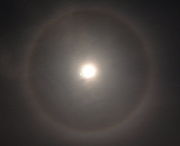From the Economist:
Not so long ago, received wisdom was that most of the human genome—99% of it—was “junk”. If this junk had a role, it was just to space out the remaining 1%, the genes in which instructions about how to make proteins are encoded.
That, it now seems, was far from the truth. The decade since the completion of the Human Genome Project has shown that lots of the junk must indeed have a function. Almost two-thirds of human DNA, rather than just 1% of it, is being copied into molecules of RNA. As a consequence, rather than there being just 23,000 genes, there may be millions of them.

Human chromosomes (grey) capped by telomeres (white). Image source: Wikipedia, public domain.
One new genetic class is known as lincRNAs. Molecules of lincRNA are similar to the messenger-RNA molecules which carry protein blueprints. However, they do not encode proteins. More than 9,000 sorts are known, and their job is the regulation of other genes.
LincRNA is rather odd, though. It often contains members of a second class of weird genetic object. These are called transposable elements - “jumping genes” - because their DNA can hop from one place to another within the genome. Transposable elements come in several varieties, but one group of particular interest are known as endogenous retroviruses. These are the descendants of ancient infections that have managed to hide away in the genome and get themselves passed from generation to generation along with the rest of the genes.
This Nature video takes you on an audio-visual journey, diving into a cell to show how genes are transcribed to make messenger RNA (mRNA) and how RNAi can silence specific mRNAs to stop them from making proteins:
References:
RNA-only genes: The origin of species? The Economist.
Not so long ago, received wisdom was that most of the human genome—99% of it—was “junk”. If this junk had a role, it was just to space out the remaining 1%, the genes in which instructions about how to make proteins are encoded.
That, it now seems, was far from the truth. The decade since the completion of the Human Genome Project has shown that lots of the junk must indeed have a function. Almost two-thirds of human DNA, rather than just 1% of it, is being copied into molecules of RNA. As a consequence, rather than there being just 23,000 genes, there may be millions of them.

Human chromosomes (grey) capped by telomeres (white). Image source: Wikipedia, public domain.
One new genetic class is known as lincRNAs. Molecules of lincRNA are similar to the messenger-RNA molecules which carry protein blueprints. However, they do not encode proteins. More than 9,000 sorts are known, and their job is the regulation of other genes.
LincRNA is rather odd, though. It often contains members of a second class of weird genetic object. These are called transposable elements - “jumping genes” - because their DNA can hop from one place to another within the genome. Transposable elements come in several varieties, but one group of particular interest are known as endogenous retroviruses. These are the descendants of ancient infections that have managed to hide away in the genome and get themselves passed from generation to generation along with the rest of the genes.
This Nature video takes you on an audio-visual journey, diving into a cell to show how genes are transcribed to make messenger RNA (mRNA) and how RNAi can silence specific mRNAs to stop them from making proteins:
References:
RNA-only genes: The origin of species? The Economist.




